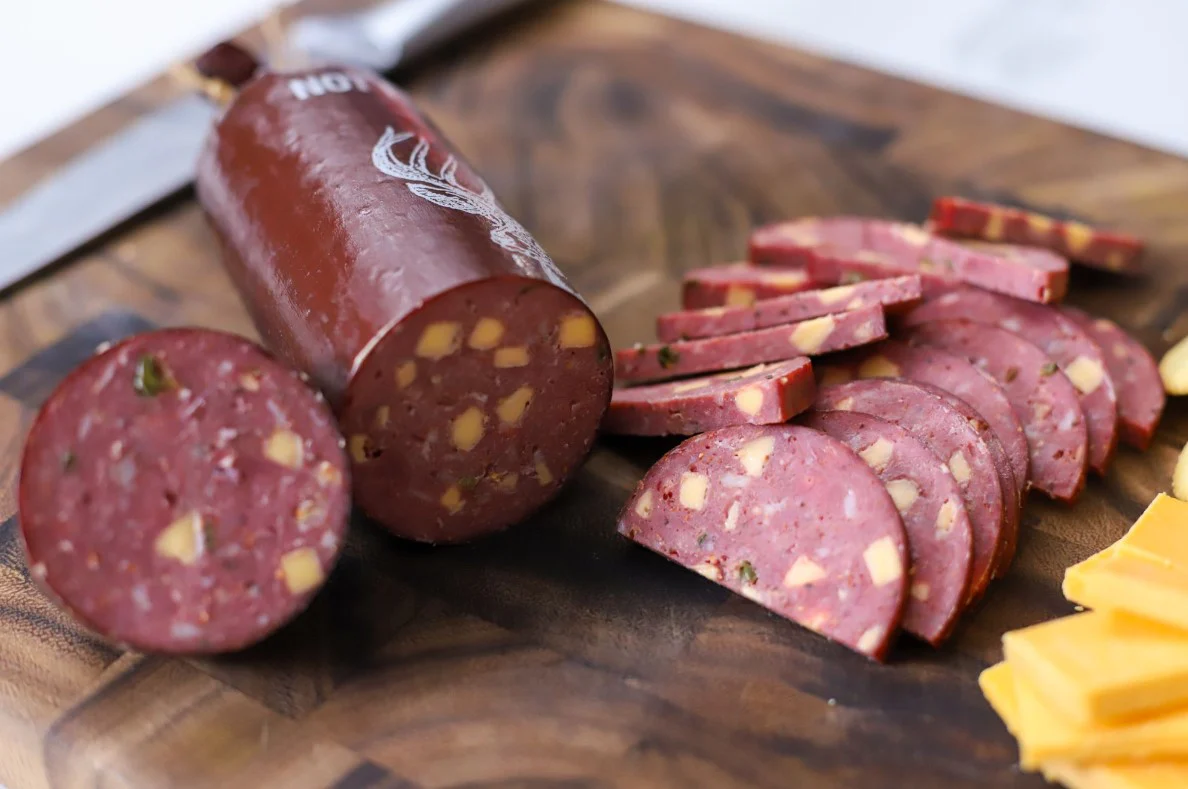What is Summer Sausage?
Summer sausages is a type of cured sausage made primarily from beef, pork, or venison. It’s called “summer sausages” because it was originally designed to be preserved without refrigeration, especially in the summer months when fresh meat would spoil quickly. The sausage is fermented, smoked, or dried to lower its pH, helping prevent bacterial growth and giving it a tangy flavor.
Key Ingredients:
- Beef, pork, or venison
- Curing salt
- Mustard seeds, black pepper, garlic salt, sugar
- Other spices may vary
History of Summer Sausage
The history of summer sausage dates back to early European settlers in America. The German-American community, in particular, helped popularize summer sausage due to its long shelf life, which made it ideal for storing during the hot summer months. Before refrigeration, people needed a way to preserve meats to prevent spoilage, and the process of fermentation made summer sausage the perfect solution. It was especially popular around the winter holidays and still is often included in gift baskets today.
How is Summer Sausage Made?
Making summer sausages involves several key steps, from selecting the meat to fermentation. The process requires precision to achieve the perfect texture and flavor.
- Meat Selection: The choice of meat is crucial for creating the ideal flavor. Most summer sausages are made from beef or pork, but venison is also a popular choice for those seeking a more rustic flavor.
- Grinding and Mixing: The meat is ground and mixed with curing salt, spices, and seasonings. Common seasonings include garlic salt, mustard seeds, black pepper, and sugar.
- Stuffing: Once the mixture is properly seasoned, it is stuffed into casings (usually a natural or synthetic casing).
- Fermentation: The sausage is left to ferment at a controlled temperature for several days. This process helps to lower the pH of the sausage, preventing bacterial growth and giving it its distinctive tangy flavor.
- Drying or Smoking: After fermentation, the sausage is either smoked or dried, depending on the desired flavor. Smoking adds a deep, savory richness, while drying results in a more concentrated flavor.
Why is Summer Sausage Popular?
Summer sausage’s versatility and long shelf life contribute to its popularity. It can be enjoyed as a snack, served on a charcuterie board, or used in a variety of dishes. Its ability to withstand room temperature makes it the ideal choice for camping trips, picnics, and road trips.
Additionally, summersausage is often included in gourmet gift baskets during the holiday season, a tradition that has been passed down for generations. The sausage’s tangy, smoky flavor appeals to a broad audience, making it a favorite in homes across the U.S.
Summer Sausage Varieties
Not all summer sausages are created equal. Over the years, different regional variations and flavor profiles have emerged. Here are a few popular types:
- Traditional Summer Sausage: The classic version, usually made with beef or pork and a blend of seasonings like garlic, mustard seeds, and black pepper.
- Spicy Summer Sausage: A bolder variety with additional spices like red pepper flakes or jalapeños for a zesty kick.
- Venison Summer Sausage: Made with venison for a gamey, earthy flavor. This is a popular option for hunters or those who prefer a leaner meat.
- Smoked Summer Sausage: This variation is slow-cooked over wood chips for a rich, smoky flavor.
- Honey or Maple Summer Sausage: These sausages have a hint of sweetness, often added through honey or maple syrup, providing a balanced contrast to the savory flavor.
Health Benefits of Summer Sausage
While summersausage is often enjoyed as a delicious snack, it can also offer certain nutritional benefits when consumed in moderation. Some of these benefits include:
- Protein-Rich: Summersausage is an excellent source of protein, which is essential for muscle repair and growth.
- Low Carbs: For those following a low-carb or ketogenic diet, summersausage is a great option as it contains little to no carbohydrates.
- Rich in Iron: As a meat-based product, summersausage provides iron, an essential nutrient for healthy blood circulation.
However, it’s important to note that summersausage can be high in sodium and fat, so moderation is key.
How to Store Summer Sausage
Proper storage is crucial for maintaining the freshness of summersausage. Here are a few tips for storing it effectively:
- Unopened Summer Sausage: If the sausage is unopened, it can be kept at room temperature for several weeks due to the curing and fermentation process. However, it should be kept in a cool, dry place, away from direct sunlight.
- Opened Summer Sausage: Once opened, summersausage should be refrigerated. It can last up to three weeks in the fridge, depending on the specific product.
- Freezing: If you want to store summersausage for a longer period, it can be frozen. Wrap it tightly in plastic wrap or foil and store it in a freezer-safe bag.
Summer Sausage in Cooking
Summersausage can be used in a wide variety of dishes. Here are some ideas for incorporating it into your meals:
- Charcuterie Boards: A must-have for any cheese and meat platter, summersausage pairs perfectly with cheeses, fruits, and crackers.
- Sandwiches: Use slices of summersausage in sandwiches, wraps, or paninis for a flavorful and satisfying meal.
- Breakfast Skillets: Chop up summersausage and add it to scrambled eggs or a breakfast casserole.
- Pasta Dishes: Add diced summersausage to pasta for an added depth of flavor.
- Soup and Stews: Summersausage can be added to soups and stews for a smoky, meaty element.
Summer Sausage as a Gift
Summersausage is a popular gift during the holiday season, especially when paired with other gourmet foods like cheeses, crackers, and jams. Many companies, such as Hickory Farms and Wisconsin Cheeseman, specialize in creating curated gift baskets featuring summersausage. These baskets make for thoughtful gifts for family, friends, or corporate clients.
Conclusion
Summer sausage is a delicious and versatile treat that has stood the test of time. Whether you enjoy it as a snack, use it in your cooking, or gift it to loved ones, this savory sausage brings a rich, tangy flavor to any occasion. With its long shelf life, it’s an ideal addition to picnics, road trips, and holiday gift baskets. The next time you reach for a snack or plan your next meal, consider adding summersausage to the menu—it’s a flavorful choice with a rich history.
Table: SummerSausage Varieties
| Type | Main Ingredients | Flavor Profile | Ideal Use |
|---|---|---|---|
| Traditional Summer Sausage | Beef or Pork, Garlic, Mustard Seeds | Tangy, Savory | Snack, Charcuterie Boards |
| Spicy Summer Sausage | Beef or Pork, Red Pepper Flakes | Spicy, Zesty | Snack, Sandwiches |
| Venison Summer Sausage | Venison, Garlic, Pepper | Earthy, Gamey | Hunting, Outdoor Events |
| Smoked Summer Sausage | Beef or Pork, Smoked | Smoky, Rich | Snack, Charcuterie Boards |
| Honey or Maple Summer Sausage | Beef or Pork, Honey/Maple | Sweet, Savory | Breakfast, Sandwiches |
Bullet Points: Key Benefits of Summer Sausages
- Rich in protein for muscle repair
- Low in carbs, making it keto-friendly
- High in iron for blood circulation
- Long shelf life, perfect for storage
- Versatile in cooking, from snacks to meals




